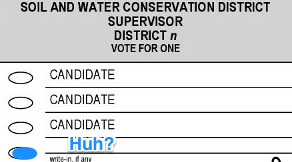 For all I know, I may have just voted for a creationist to select my kids’ science curricula, or a reckless corporate polluter to set environmental protections in my water conservation district. But it’s not my fault.
For all I know, I may have just voted for a creationist to select my kids’ science curricula, or a reckless corporate polluter to set environmental protections in my water conservation district. But it’s not my fault.
When it comes to the less publicized “down ballot” races, voters need much more information than is currently readily available. I voted absentee several weeks before election day. On my presidential vote, I like to think I was supremely informed. But when it came to votes involving the judiciary, school board, and water conservation district, I was embarrassingly uninformed.
Fortunately, voting absentee gives you time to do some research. So, I figured an earnest, computer-savvy fellow like me could be pretty well informed after a dozen or so clicks.
I was shocked about how little information I could find about those backwater candidates. When it came to the more obscure candidates and ballot questions, there hadn’t been any news coverage. This was partially because reporters were waiting to do stories closer to the election — which is increasingly becoming a problem now that large numbers of citizens are voting early — and partially because newsrooms have shrunk so much in recent eyars that many of these obscure races simply go uncovered. Surprisingly, the rest of the interwebs was not much better. I found a little information about the unpublicized candidates, but not nearly enough.
So, I slumped in civic shame, as I guessed on a few and skipped a few. From conversations with friends, I know I’m not the only clueless voter in the land. In fact, I know a lot of new and casual voters who guessed and skipped much more than I did.
We can run a better democracy than this, people. With all due respect to Mr. Trump, I’m less concerned that our elections are rigged than I am that our elections are un- or under- informed.
There is a simple fix to this that wouldn’t cost very much. I’ve been told there is this thing called “the Internet,” where people can instantly access information, even on devices most people carry in their pockets into polling places, and everyone can access in public libraries. So, why can’t do-gooders create a nonpartisan website where candidates — even humble down ballot candidates — can supply information about their background and positions on top issues?
Maybe we call the website something like MNvoting.com, and fund it with philanthropic and/or government funding. Maybe it has a multi-partisan Board of Directors governing it. Maybe the organization creates the basic web space for content, but allows candidates to generate all of the relevant content. Maybe the website includes comment fields for folks to dispute candidates’ claims. Maybe we promote this wondrous new centralized website to voters via a marketing campaign. These kinds of details obviously can be worked out by the smart people.
But we can do better. In just a couple of clicks, I can currently get a thorough evaluation of a restaurant, movie, or just about any type of product or service. The same needs to become true of ALL of the ballot questions Minnesotans are being asked to decide at the ballot box, not just the top-of-the-ticket questions.
